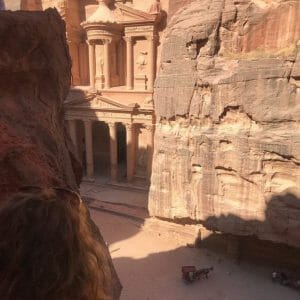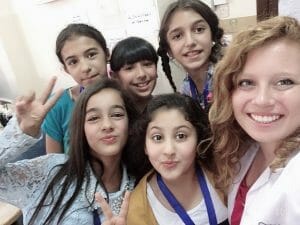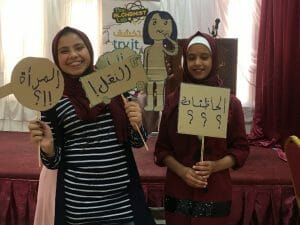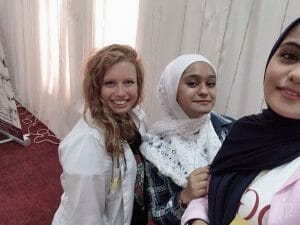
This blog post was written by Arizona State University student Maddie Handler. Read her first blog post "The economic x-ray of Jordan" and her second post “Unveiling Syrian Refugee Camps.” Handler is the first intern for The Alchemist Lab, founded by 2018 WE Empower Challenge awardee Hadeel Anabtawi.
As I reflect on my time in Jordan, I have been fortunate enough to accomplish more in three months than most do in a few years. I have traveled to 12 cities, attended U.S. Embassy events, met prestigious business leaders and joined a global women’s network. The most rewarding, challenging and enlightening experience of all, has been teaching (and subsequently learning) from the girls at our Go Girls boot camp.
One of my central goals for traveling to Jordan was to develop a profound understanding of the United Nations Sustainable Development Goals 4 (Access to Quality Education) and 5 (Gender Equality), especially from the perspective of a male-dominated Muslim country. Under the guidance of Hadeel Anabtawi and her team, specifically Suad Alaggad, I was introduced to both of these SDGs in Jordan. Together, Suad and I ventured across Jordan from Amman to Petra, working with girls age 10 to 24. Here are some of the lessons I have learned from each of our experiences:
The first boot camp
The first camp Suad and I hosted was in the Gaza refugee camp located in the town of Jerash. Here, the 25 girls had the biggest age gap from the youngest of 12 to the eldest of 24 (she was not able to read or write). These girls are from families of Palestinian refugees from the first exodus in 1948. All they truly know is that the school is a one-mile walk from the town center, and most have never left the camp, which is more a slum than a refugee site.
Most of the women in the camp are married around the average age of 16 (after they finish school). These marriages tend to be arranged marriages, or marriages to a boy they have met walking on the streets. There are strong efforts being made to address the lack of opportunities to develop healthy relationships, starting with the SEP (social enterprise) Academy, where we hosted our camp. The SEP Academy is a social enterprise within the camp, founded by an Italian woman named Roberta. She hires refugee women to practice sewing skills and create scarves and other accessories that are then sold in a boutique in Switzerland. She is constantly battling the governments of both Jordan and Palestine to pay the women a living wage. Her current project is founding a childcare center within the academy for the children of workers.
With this background knowledge, Suad and I were immediately empowered with our program because we were located in a safe space for the girls to discuss topics that they would normally not address with their families: business ideas, tertiary education and even men. In our program they worked on how to make better decisions and how to overcome challenges within their community. Unfortunately, however, this was our first camp and unbeknownst to us, as an American citizen, I needed government documents to even enter the campsite (despite lack of security in the entrance). Because of this constriction, we had to shorten our event to three sessions only (we had six originally planned). Although I was disappointed, it was very enlightening to learn that these restrictions are holding us back from further assisting the community. It has encouraged me more than ever to support refugee activities and fight these limitations because the talent of the girls is truly being suffocated.
The second boot camp

In the face of our frustrations, Suad and I continued to fight for our programs. Our second location was in partnership with Madrasati, a Queen Rania initiative for girls’ education. With this backbone, we traveled to Salt, a small, poorer town about 45 minutes outside Amman. Here, we were stationed in a local all-girls secondary school, also government funded. The 20 girls in this camp, age 10 to 13 years, were vibrant and excited.
One of the first shocking lessons I learned about the girls is that 90% want a medical career. When we asked the girls "why medicine?" we became aware that their families believe that the only route to a successful future is attending medical school. Jordan’s economy is saturated with doctors and engineers. We tasked them what happened with an entire country of only doctors? As we became closer, the students wished to learn more about me and my life in America. They were astounded to understand that I am a businesswoman, unmarried and that I had absolutely no interest in medicine whatsoever (in spite of the fact that I was raised by a doctor!). By the end of the camp, some personally told me that they, too, wanted to make a difference in ways outside of their family ideals.
The second lesson I was taught from the Salt girls was how much they loved to hug, laugh, kiss and smile. Each morning, every single girl from the shyest to the most outgoing would line up to give me hugs and kisses on each cheek. I asked the Madrasati team why this was, and I learned that because the families in the town were so large and traditional Islam, most girls became forgotten and lost among their older brothers. They don’t receive a lot of physical love, so as soon as they knew I was open to touch, one had to be holding my hand constantly. By the end of this particular camp, the young girls finally understood what women empowerment meant and that they were each responsible for making the changes that they want to see.
The final boot camp

Our final boot camp was a three-day expedition to the small village of Rajef outside of Petra. Suad and I left early in the morning via four-hour JETT bus ride from Amman to Petra. There, we hired a cab to drive us up the mountains to the tiny town. This camp was held in the town’s reception hall. The 18 girls attending this camp, age 14 to 17, all attended the only all-girls school in the area, and therefore knew one another. These were some of the smartest students I had met from any location to which I had traveled. They spoke amazing English, had big future plans for college education to the college in Karak, and few, if any, were interested in marriage or boys. This I attributed to the constant efforts of Noura, the local headmistress, who stressed the importance of learning other languages and life outside their small town. It is influential women like these who affect the thought process of local girls and who push them outside their comfort zone to problem solve.
I also became aware from the girls in Petra that they want to learn — and maybe even more impressive, they want to travel. In one activity, Suad pretended to be a genie to learn the deepest wish of each girl, and from nearly every single one, there was a desire to travel to foreign locations like Germany, Australia, the U.S., and most importantly, Paris.
The minute one of them found out I spoke French, they asked to learn some simple words and phrases. More than any other students, these girls took the time to ask questions and to identify problems in their communities that most wouldn’t even consider — early marriage, lack of gun safety and overpopulation, for example. From there, they presented dramatic skits and poetry depicting the problems and subsequent solutions they had to fix the issues at hand. Suad and I were both beyond impressed with their dedication to decision-making and problem solving and desire to become empowered for change.

In conclusion, even as the girls were learning from me, I was learning more from them. As I began to understand the unheard struggles and challenges of the refugee world, I started to comprehend the secret desires of girls both young and old, and most importantly, I learned that these students want these chances for empowerment. They want to understand how to make decisions to solve the problems in their communities. More than anything, I am hoping to extend my internship experience to other female college students looking to actively understand and participate in the movement that is U.N. SDGs 4 and 5. No matter where they are from, girls are truly the future of world changers.